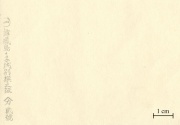Difference between revisions of "Japanese vellum"
Jump to navigation
Jump to search
(username removed) |
|||
| (3 intermediate revisions by 3 users not shown) | |||
| Line 2: | Line 2: | ||
== Description == | == Description == | ||
| − | A thick, ivory-color, semi-translucent paper that resembles [ | + | A thick, ivory-color, semi-translucent paper that resembles [[vellum]]. Produced in Japan, Japanese vellum is contains long fibers obtained from the interior bark of a tree. It is a very tough, durable, and wear resistant paper. Japanese vellum is used for diplomas and specialty papers. A poorer quality imitation vellum paper, called japon, is made by acid treating ordinary paper. |
== Synonyms and Related Terms == | == Synonyms and Related Terms == | ||
| Line 8: | Line 8: | ||
vellum paper; imitation vellum; vegetable vellum; torinoko; japon | vellum paper; imitation vellum; vegetable vellum; torinoko; japon | ||
| − | == | + | ==Resources and Citations== |
| − | * | + | * Matt Roberts, Don Etherington, ''Bookbinding and the Conservation of Books: a Dictionary of Descriptive Terminology'', U.S. Government Printing Office, Washington DC, 1982 |
* ''The Dictionary of Paper'', American Paper Institute, New York, Fourth Edition, 1980 | * ''The Dictionary of Paper'', American Paper Institute, New York, Fourth Edition, 1980 | ||
| − | * | + | * E.J.LaBarre, ''Dictionary and Encyclopedia of Paper and Paper-making'', Swets & Zeitlinger, Amsterdam, 1969 |
* ''A Glossary of Paper Conservation Terms'', Margaret Ellis (ed.), Conservation Center of the Institute of Fine Arts, New York City, 1998 | * ''A Glossary of Paper Conservation Terms'', Margaret Ellis (ed.), Conservation Center of the Institute of Fine Arts, New York City, 1998 | ||
| − | * Art and Architecture Thesaurus Online, | + | * Art and Architecture Thesaurus Online, https://www.getty.edu/research/tools/vocabulary/aat/, J. Paul Getty Trust, Los Angeles, 2000 |
| − | * | + | * Edward Reich, Carlton J. Siegler, ''Consumer Goods: How to Know and Use Them'', American Book Company, New York City, 1937 |
[[Category:Materials database]] | [[Category:Materials database]] | ||
Latest revision as of 15:44, 7 September 2022
Description
A thick, ivory-color, semi-translucent paper that resembles Vellum. Produced in Japan, Japanese vellum is contains long fibers obtained from the interior bark of a tree. It is a very tough, durable, and wear resistant paper. Japanese vellum is used for diplomas and specialty papers. A poorer quality imitation vellum paper, called japon, is made by acid treating ordinary paper.
Synonyms and Related Terms
vellum paper; imitation vellum; vegetable vellum; torinoko; japon
Resources and Citations
- Matt Roberts, Don Etherington, Bookbinding and the Conservation of Books: a Dictionary of Descriptive Terminology, U.S. Government Printing Office, Washington DC, 1982
- The Dictionary of Paper, American Paper Institute, New York, Fourth Edition, 1980
- E.J.LaBarre, Dictionary and Encyclopedia of Paper and Paper-making, Swets & Zeitlinger, Amsterdam, 1969
- A Glossary of Paper Conservation Terms, Margaret Ellis (ed.), Conservation Center of the Institute of Fine Arts, New York City, 1998
- Art and Architecture Thesaurus Online, https://www.getty.edu/research/tools/vocabulary/aat/, J. Paul Getty Trust, Los Angeles, 2000
- Edward Reich, Carlton J. Siegler, Consumer Goods: How to Know and Use Them, American Book Company, New York City, 1937
